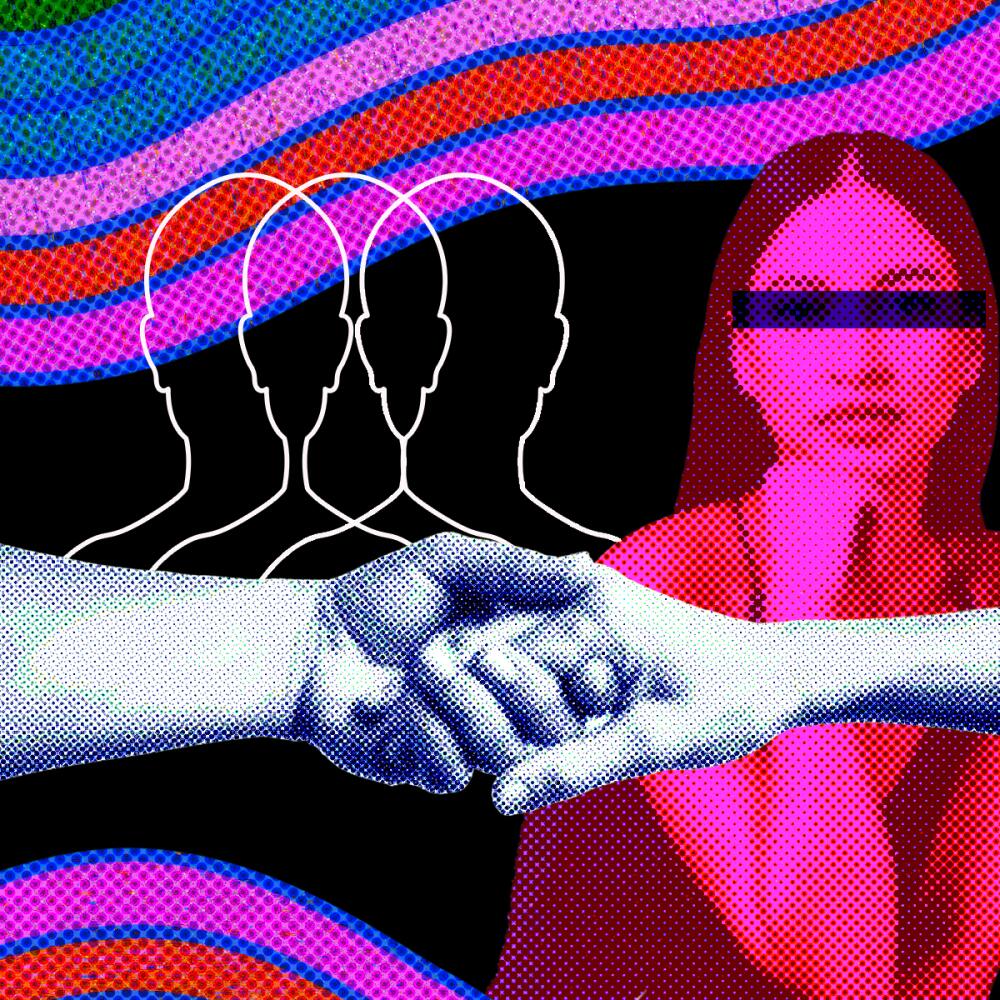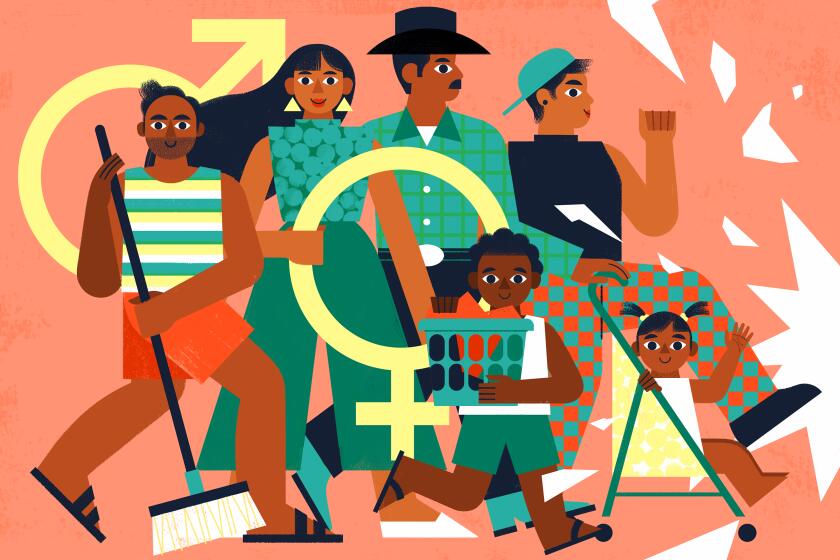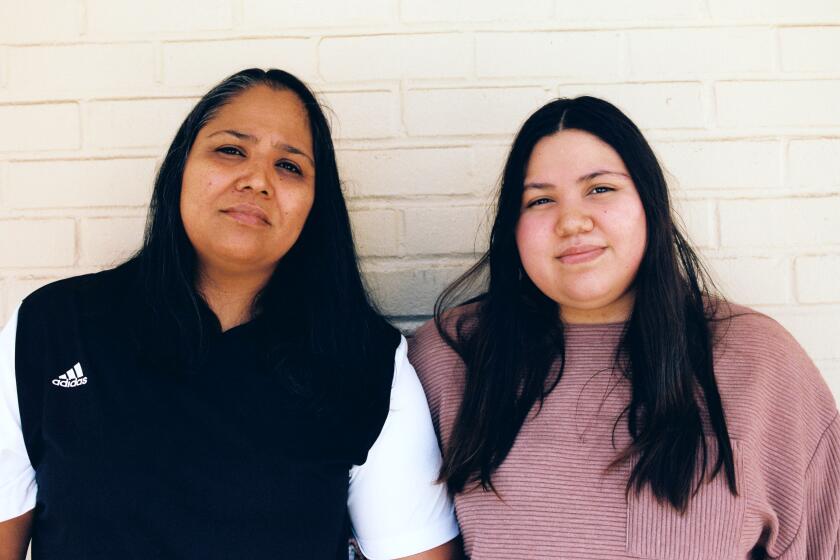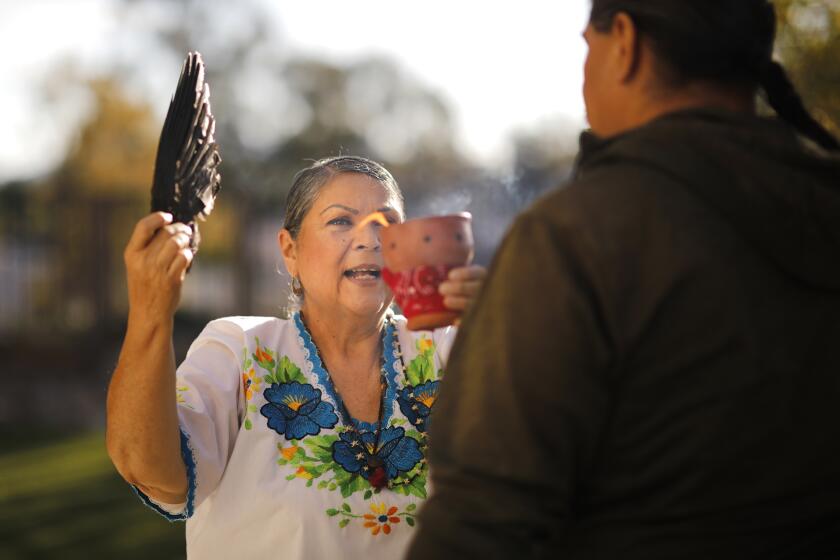
My first session with a Latina therapist was transformative. She used words like we and our.
“As Latina daughters, we give until we can’t…”
“Our culture thrives and suffers because of familismo…”
This was a stark departure from my first experience with therapy more than a decade earlier when I needed help navigating family chaos and grief related to my mom’s untimely death. As an uninsured 26-year-old freelance journalist, I paid a sliding scale fee of $15 to sit across from a young white woman whose lopsided blond hair gave me something to focus on as she hammered me with loaded questions.
Young Latino creatives are letting go of traditional gender norms — and forging their identities in new and freeing ways.
“Aren’t you also responsible for maintaining these toxic dynamics?”
“Why are you choosing to play such a caretaking role in your family?”
It was my hope that her tiny, windowless office could become a safe place to complain about my family and get some guidance. That hope was quickly dashed when I spent each session explaining things like interdependence, machismo and intergenerational trauma. These of course are common issues in Latino families, though she clearly had no point of reference for them. Over time, I became increasingly uncomfortable talking to someone who didn’t understand how these dynamics regularly stamp out the light of immigrants’ daughters like me. I quit therapy shortly after, chalking up the bad experience to: “You get what you pay for.”
Years later, I think of my first foray into therapy very differently. The tidy phrase that comes to mind is cultural competency, of which my therapist had none. Sadly this is a common experience for marginalized people seeking mental health services, and the situation is particularly dire for Latinos.
A new generation of Latinos is having difficult conversations with their parents on topics like mental health and therapy that have often been ignored.
We are the nation’s youngest and largest ethnic group, and about a quarter of the population are millennials — a demographic that is seeking therapy more than previous generations. But the nationwide shortage of mental health professionals is hitting our already underserved communities the hardest. When coupled with the fact that the vast majority of therapists are white, the difficult task of finding a good, culturally competent therapist has become even more challenging. The timing could not be worse for “elder” millennials like me: Latinas in our 30s who desperately need help creating healthier family dynamics — and this includes maintaining emotional and financial boundaries with our aging parents.
Defining Latino family dynamics
The Latino community is far from a monolith; it’s actually one of the most diverse in the world. That said, mental health professionals in the United States say there are “common threads” among Latino patients seeking care. Family is at the top of the list, said Dr. Lisa Fortuna, the chair of the department of psychiatry and neuroscience at UC Riverside. The Puerto Rican psychologist has spent years studying and researching Latino and immigrant mental health.
“There is cultural messaging that family is the most important,” Fortuna said. “You have a responsibility to your family — especially for those of us who come from parents or grandparents who migrated to bring better opportunities for themselves and for the generations that came after. Our parents took care of us, and we will take care of our parents. These are the cultural expectations; this is the water we swim in.”
Curanderismo is a traditional healing practice with many forms and applications. Its acceptance is growing in some corners of the medical community.
Intense family bonds can be a beautiful thing, but when you factor in migration, the dynamics become more complex. As journalist Nicole Froio reported in a groundbreaking piece for Refinery29 about young Latinos who are “breaking up” with their abusive parents, our immigrant parents often have untreated intergenerational trauma “related to their own migration, poverty, or history of abuse, as well as ultra-conservative and fundamentalist beliefs rooted in religion, white supremacy, and patriarchy.”
People forced to spend decades of their lives operating in survival mode can also make a lot of parenting mistakes — including perpetuating abuse or engaging in parentification. That latter is a distortion of boundaries leads to a role reversal in which children are treated as adults and forced to take on adult responsibilities. For the children of immigrants, this can mean taking care of younger siblings while the parents are at work, serving as an interpreter and translator, or having to enter the workforce at a young age to help pay the bills. In many cases, parentification occurs out of necessity
“The moment you get to the United States, you take off running because you’re in survival mode,” said Mireya Lupercio, a first-generation Mexican American therapist and social worker in Wilmington, N.C. “You often don’t realize you’re re-creating cycles because you don’t have time to. You’re dealing with a lack of money and resources and time, but the biggest factor our parents are dealing with is their own intergenerational trauma.”
Lupercio said that parents who migrate to the United States are risk-takers and often, these risks come with additional trauma. Left untreated, the effects bleed into the lives of their children, who as adults contend with their own first-generation trauma on top of the price they often pay for their parents’ exploitation.
“Parents migrate here and work their whole lives, but they’re not left with very much economically because their labor was exploited,” echoed Fortuna. “The tension for younger-generation Latinos is figuring out how to take care of themselves and their parents. It’s very anxiety-inducing, especially the idea of putting financial and emotional boundaries in place. Of course many don’t want to turn their backs on their parents. It’s just a lot to hold.”
Toxic gratitude or ‘Si Dios Quiere Syndrome’ is the concept that Latinos are too content with just receiving scraps instead of demanding what they deserve.
In 2021, I wrote about how my dad’s impending retirement as a janitor in Downey was barreling toward my life in North Carolina “to destabilize me.” Oh, how right I was. My financial stability is now tenuous at best. My savings are gone. This month I made an early withdrawal from my retirement account to pay my dad’s back taxes and mortgage — robbing from my own future to give him a carefree present.
Through therapy I’ve also learned that attributes I once thought were simply personality traits, like my hypervigilance, are a direct result of having a parent who never felt safe. And as I endeavor to give my dad worry-free golden years, having Latina therapists who can relate to my situation has helped me strategize and give voice to the uncomfortable feelings that arise as I help to support two different households: the distress, anxiety and sometimes even resentment.
I have many friends who are also the children of immigrants and find themselves in the same boat, and venting to them is a tremendous help. A few weeks ago after a good cry in therapy, I reached out to a friend who is supporting her mother. In a text, I declared that “the American dream is b—.” Why couldn’t our parents’ hustle lead to generational wealth instead of generational trauma? Why couldn’t the Vasquez American story be more like the Saavedras’, the Mexican family behind the Tapatío empire whose family compound is just minutes from my dad’s rickety house? Her response? “What doesn’t kill us makes us broker.”
There are many therapists who would call these family dynamics co-dependent — or worse. Fortuna said people training to become mental health professionals take classes where they discuss providing care to different demographics. Students are taught that Latinos are “interdependent” and “collectivist.” But what does that really mean?
“Therapists have that book knowledge, and often little understanding of what this looks like across generations,” Fortuna said. “A therapist might say, ‘Why can’t you just let that co-dependence go? Why can’t you set boundaries for yourself? Why can’t you individuate?’ I feel like this is getting better, but there’s still a lot of pathologizing of our perspective and cultural dynamics.”
Malcriadas
Deciding to enter therapy can be a major first step toward healing difficult family dynamics, which is why it can be catastrophic to have a bad therapist with zero cultural awareness. This is something Lucia learned the hard way.
The 30-something is using a pseudonym because she fears repercussions from her family, which she said maintains “toxic” and “abusive” dynamics. Lucia grew up fielding abuse from her father, raising her younger siblings and serving as an emotional sounding board for her parents — the ultimate trifecta for the eldest daughter of Caribbean immigrants. About a decade ago, when she was living in New York City away from her family for the first time, Lucia decided to enter therapy. She wanted a therapist of color, but none were available as part of the sliding-scale service she used. Lucia was assigned a white woman who “acted really weird” about her queer identity. With nowhere else to turn, Lucia went back for a second session. There would not be a third.
“I’m a survivor of multiple kinds of abuse that started in my family home,” Lucia said. “In the second session, I was explaining that I felt like the early abuse set me up to fail in relationships. So I’m telling this personal story about intimate partner violence and the therapist tells me that ‘Hispanic people’ are inherently more violent and abusive. It was horrible. Therapy is supposed to be this sacred space where you can be vulnerable. This lady might as well have punched me in the gut.”
Lucia later went on to have a Latina therapist who understood her family dynamics and helped her stop feeling guilty about carving out a life for herself away from her family, but she said that her early experience was a reminder that therapy is not “immune to racism and xenophobia.”
“You’re bound to have some therapists who are basically looking to affirm their own bias or their own beliefs about people of color and people of different ethnicities,” Lucia said.
Whether in a therapist’s office or in articles such as this, Lucia said it’s important to be mindful of how we discuss the abuse that sometimes stems from common Latino family dynamics.
“Many people from many different backgrounds have similarly abusive parents, but I think if we keep relegating these issues to a cultural realm, we’re going to keep having these encounters with outsiders that are like, ‘Yeah, you guys are just more violent,’” Lucia said.
Froio said that writing about Latinos who chose to be estranged from their abusive parents led her to reflect on her own journey as a queer Brazilian and Colombian feminist who now lives near her parents in Rio de Janeiro. Like many of us, Froio had early experiences with white therapists who didn’t understand her cultural context. She now has an Afro-Latina therapist who conducts sessions with her in her native Portuguese, something that helped Froio realize that doing therapy in English didn’t allow her to adequately express her feelings. Many of her therapy sessions focus on her relationship with her family and the ways that being her authentic self challenges the “heteropatriarchy, Catholicism and standards of American whiteness” that they hold near and dear. Confronting these issues — and even grappling with them publicly — is necessary work, she said.
“Latino households are not specifically toxic,” Froio said. “We’ve just been taught this very narrow idea of the family — and that means something very specific for Latinas, who take on a lot in their families and are expected to just give up their happiness. When you set down boundaries with your parents, the conflict might be really bad, but you are helping them evolve into the next phase of your own adulthood.”
The journalist and researcher said that there is an idea that because we’re talking about our cultures and identities, we have to “uplift it no matter how wrong it is.” This is especially true when we’re talking about family dynamics. How do we remain protective of our parents, honor their sacrifices and honestly discuss the unhealthy dynamics that harmed us? More importantly, as the daughters of immigrants, how do we end the practice of bleeding ourselves dry for the benefit of our families.
Therapy is a good place to start.
Lupercio said that women in Latino families are often taught that the word “no” isn’t an option. We have privileges our parents couldn’t dream of, like the resources and time to address our mental health, so our parents may not know how to embrace us as trailblazers when we pursue mental health services.
“For some of our parents, they see our independence as an issue; they’ll say we’re being malcriadas or entitled, or they’ll say, ‘Tu cres que lo sabes todo.’ The gaslighting begins, and it’s easy to internalize this. Our newfound independence is now a threat to our families,” said Lupercio, who noted it’s “still important to keep pushing forward” and have empathy for our parents’ experiences while still choosing to prioritize ourselves.
As I’ve embarked on my own therapy journey, I have yet to find the courage to ask my dad what healing looks like for him. I’m afraid to ask the question, and somehow more afraid to hear the answer. I’m terrified of the depth and breadth of his pain, and I worry that I would abandon my own process to support him through his. I have asked him to enter therapy. He refuses.
So like many Latinas who came before me and will certainly come after, I’m walking this path alone and carrying the baggage of multiple generations. One step at a time.
More to Read
The Latinx experience chronicled
Get the Latinx Files newsletter for stories that capture the multitudes within our communities.
You may occasionally receive promotional content from the Los Angeles Times.










